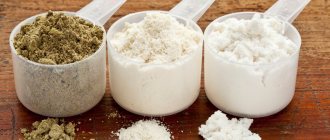It would seem that the topic of sports nutrition and its proper use has already been fully covered, but I continue to meet people in training who have not yet figured out how to properly take protein. Let's look at the answers to such pressing questions, from the point of view of any gym goer: how much protein should be consumed per day, how many times a day and when.
The very first question regarding proper protein intake is: how much protein should you consume per day? Let me clarify that here protein refers to a sports supplement, and not protein in the usual sense. There are many opinions on this matter, and they tend to be average. The thing is that the daily protein intake of a particular person is influenced by quite a few factors: the serving size of protein consumed with regular food, the number of meals per day, the number and intensity of training, the goal (weight loss or muscle gain).
I covered the answer to this question in more detail in the article “Protein: how much protein do you need per day?” Read the article and determine how much protein you need to consume daily. After this, make up your diet for the day and calculate how much protein you get from food and how much protein, based on the received daily requirement, needs to be added to provide the required amount of protein per day.
How much protein per day should you take?
Every cell in the human body contains protein, so a sufficient daily portion of protein is necessary . In addition to its positive effects on growth and development of strength and muscle mass, proteins also improve hormone production, strengthen the immune system, and promote hair and nail growth. Whether you take protein from animal or plant sources, the amount you need per day depends on many factors. You should also consider your age, weight, physical activity, and your goal —whether you want to lose weight or gain muscle.
How and how much protein should you take per day?
How to take protein? Agree, such a question either did not arise in your mind, or for a moment it emerged from your subconscious and immediately hid back, satisfied with the excuse: “It’s all written on the package.” Firstly, it is not written, and secondly, it is impossible to achieve high results without following the dosage regimen, even if the best brand of sports nutrition was chosen. It’s like in the situation with medications: you didn’t take the dose enough and it didn’t help, you took too much and it became bad, you missed a dose and you erased previous achievements. Therefore, today we will look in detail at how to drink protein correctly, and also share tips on turning the monotonous process of preparing a bland protein shake into a tasty and enjoyable ceremony.
Minimum daily protein intake
Daily protein intake is calculated in grams per kilogram of body weight, starting at 0.8 grams of protein per kilogram of body weight. [1] But such a minimum portion is not suitable for athletes , because the more intensely an athlete trains, the more protein his body requires .
How to consume protein depending on your goal?
Depending on the purpose of using protein (weight loss, gaining muscle mass, to achieve relief), the dosage and time of taking the supplement will differ. Let's look at the main and most common options.
- How to take protein for weight gain . To achieve this goal, you need to distribute the daily portion of protein into 5-6 servings. It is better to give preference to whey or egg protein. The daily intake should not exceed 2 grams per kilogram of weight (during normal training). An enhanced program will require an increased amount of protein intake up to 2.5 grams.
- How much protein to drink for weight loss . You should have 2 types of protein: fast isolate (whey) or complex (whey and egg), slow (casein); • Drink according to the same scheme as for gaining muscle mass, with the only difference being that you can replace 2 meals with slow-acting protein (casein); • Playing sports is the basis for acquiring ideal shape; • You can additionally use various fat burners, for example, L-carnitine.
- How to take protein for muscle growth and muscle mass gain . At night, muscles go through a recovery cycle, so you need a portion of protein in the morning. Drink a serving of a quickly digestible protein shake (whey or complex) half an hour after waking up; • During the day. The amino acid pool must be regularly replenished, and therefore between meals you need to drink a portion of isolate (or complex protein); • Before training. 40 minutes before classes, drink isolate to maintain the existing level of amino acids in the muscles; • After training. This is a risky period for catabolism: glycogen reserves and amino acid concentrations decrease. Drink complex protein with fast carbohydrates, gainer with simple carbohydrates; • Before bedtime. To ensure the flow of amino acids, drink casein protein (absorbed in 6-8 hours).
Optimal daily protein intake
Various studies have examined the required daily amount of protein and its effect on the body . Basically, 1.5 g of protein per 1 kg of weight . Only a few studies have examined higher protein intakes of approximately 2.2 to 3.3 g/kg . However, not a single study has revealed a negative effect of protein on human health . [17] In the table below you will find the basic breakdown of daily protein intake according to the main factors . [10]
At a healthy weight
| Way of living | Weight maintenance | Muscle growth | Weight loss |
| Passive lifestyle | 1.2–1.8 g/kg | 1.2–1.8 g/kg | 1.2–1.8 g/kg |
| Active lifestyle | 1.4–2.0 g/kg | 1.4–2.4 g/kg | 1.6–2.4 g/kg |
If you are overweight
| Way of living | Weight maintenance | Muscle growth | Weight loss |
| Passive lifestyle | 1.2–1.5 g/kg | Not applicable | 1,2–1.5 g/kg |
| Active lifestyle | 1.2–1.5 g/kg | 1.4–2 g/kg | 1.4–2 g/kg |
Optimal daily protein intake for muscle growth
The combination of intense training and the right amount of protein is the golden path to success . Below we have provided a table of correct protein intake , based on body weight and suitable for both women and men .
| Weight | Minimum portion | Maximum portion |
| 45 kg | 63 g | 150 g |
| 57 kg | 80 g | 187 g |
| 68 kg | 95 g | 225 g |
| 79 kg | 111 g | 262 g |
| 91 kg | 127 g | 299 g |
| 102 kg | 143 g | 337 g |
| 113 kg | 158 g | 374 g |
| 125 kg | 175 g | 412 g |
Based on the table, we can see that athletes and active adults can minimize body fat gain by increasing their protein intake to 3.3 grams per kilogram of body weight. [10] Thus, a healthy adult athlete who wants to achieve muscle growth and currently weighs 200 pounds could consume up to 299 grams of protein per day.
Research has shown that if you gradually challenge your body during exercise and eat a hypercaloric diet (consuming an additional 370-800 kcal), you will lose more fat if you take 3.3 g/kg protein than if you take 1.8 – 2.6 g/kg. [18] [19] It should be noted that the maximum portion of protein will not help build more muscle than the minimum portion. However, it can minimize your intake of fat from your diet , which will help you shed those extra pounds. Also remember that your daily protein intake should be based on body weight, not calorie intake . Calorie intake, on the other hand, should be based on your weight and the goals you set for yourself.
Optimal daily protein intake for weight loss
One previous study found that athletes should consume about 1.8–2.7 grams of protein per kilogram of body weight . [20] However, recent research suggests that in order to minimize muscle loss during dieting, athletes should consume 2.3 to 3.1 g of protein per kilogram of body weight . [21] This value is also confirmed by the International Society of Sports Nutrition. [22] The recommendation, however, only applies to relatively slim people who are trying to shape and strengthen their figure. Some studies have shown that a serving of 1.2-1.5 g/kg is appropriate obese to maximize fat loss. [23] [24] [25] The European Association for the Study of Obesity protein intake for obese adults . [26]
Given the health risks associated with overweight and obesity , it is also interesting that consuming high-protein diets (about 27% of daily caloric intake) may reduce cardiometabolic risk factors , including blood pressure or triglyceride levels, and may also help increase HDL cholesterol levels . But it is worth recognizing that these effects were observed only in small quantities. [27]
In the table below you will find the daily protein intake for healthy adults and overweight people. The values are broken down by body weight in kilograms. [10]
For overweight and obesity
| Weight | Minimum portion | Maximum portion |
| 45 kg | 54 g | 68 g |
| 57 kg | 68 g | 85 g |
| 68 kg | 82 g | 102 g |
| 79 kg | 95 g | 119 g |
| 91 kg | 109 g | 136 g |
| 102 kg | 122 g | 153 g |
| 113 kg | 136 g | 170 g |
| 125 kg | 150 g | 187 g |
At a healthy weight
| Weight | Minimum portion | Maximum portion |
| 45 kg | 100 g | 150 g |
| 57 kg | 125 g | 187 g |
| 68 kg | 150 g | 225 g |
| 79 kg | 175 g | 262 g |
| 91 kg | 200 g | 299 g |
| 102 kg | 225 g | 337 g |
| 113 kg | 249 g | 374 g |
| 125 kg | 274 g | 412 g |
Remember that calculating your daily protein intake is based on your actual body weight , not the ideal weight you want to achieve. Therefore, if you are on a diet and want to reduce body fat as much as possible without losing muscle mass, you need to take 2.3 – 3.1 g/kg of protein per day . People who are overweight or obese need to take 1.2-1.5 g/kg protein throughout the day. [10]
Can proteins be harmful?
You may have heard the myth that proteins damage the kidneys , cause liver failure or osteoporosis. The fact is that this statement has not been confirmed by any research , and there is no evidence of the negative effects of protein in the body of healthy people . [4] Of course, if you have kidney or liver problems, you should consult your doctor before taking protein supplements.
What is protein?
Proteins are molecules made up of amino acids. In addition to building muscle, they perform many other functions in the body. Protein in the body is broken down into amino acids. From these, the human body produces its own protein, which the body uses to function.
Each person has different protein needs. To understand how many grams of protein you need, you need to consider the individual. For example, bodybuilders drink more protein per day because their muscles need to be repaired.
How much protein should you take after a workout?
Numerous studies have been conducted on how much protein you should take per serving. Older studies agree that 20-25 grams of high-quality protein is sufficient to maximize protein stimulation in muscles. [12] [13] [14] However, newer studies have questioned this result. They cite that previous studies did not take into account the amount of pure muscle mass. Thus, an individual with a higher proportion of pure muscle mass requires a higher proportion of amino acids to maximize muscle growth and regeneration after exercise. These studies conclude that muscle protein synthesis is increased by consuming 40 grams of whey protein after exercise. [5]
In any case, more research is needed for scientists to know the most appropriate amount of protein per serving As a result of studies that showed an optimal serving of 20-25 g , a study was conducted on a group of people who trained only their legs . While the studies that showed the ideal 40g serving were based on a group of people who did full-body circuit training . Therefore, the indicators of these studies are not consistent with each other. Also, do not forget that increased muscle activity during training requires more amino acids and protein for recovery. [eleven]
At the same time, muscle tissue requires about 25-30% of total protein intake. This means that consuming more protein does not necessarily stimulate muscle growth . For example, taking a 70g serving of protein will have the same effect on muscle growth as eating a 40g serving of protein. However, increasing your protein intake does not mean you are wasting it. [6] [15] The body stores protein as an energy source for further training. [9]
Also, during the same study, scientists received different results, since protein intake for each person depends on individual needs . For example, age, weight, training intensity, sports goals and fitness level. Regardless of how much a single serving of protein is (20 or 40 g) , it is important to divide your protein intake throughout the day - up to 5 times. This will help to constantly stimulate protein synthesis in the body. [8]
When is the best time to take protein?
Timing your protein intake is just as important as getting the right daily portion . As stated earlier, this depends on your fitness goals and current weight. Athletes need to regularly receive proteins throughout the day, in the amount of 20-40 g . An effective solution is a combination of the right protein and time . It is optimal to divide the intake into 5 stages - morning, afternoon, evening, before training and after training.
In the morning
Research shows that the body is most sensitive to the effects of amino acids from protein 24 hours after exercise. [36] High quality, fast-absorbing whey protein is a great way to start your day and is ideal for muscles. However, if you want to completely replace your breakfast with protein, then it is better to use casein . [37]
During the day
To get the desired amount of protein per day, it is advisable a protein shake , bars or other protein snacks as a snack Supplementing with protein can also be done through a protein drink or natural protein sources.
In the evening, before bed
A protein shake before bed can be very effective for burning fat , as well as increasing strength and muscle mass . In this case, the best choice is caseins, also called overnight proteins, which are slowly absorbed, providing protein to your muscles while you sleep. [33] [34] [35]
Before training
When you drink a protein drink before your workout, you will get the same benefits as when you drink it after your workout. [32] Fast-absorbing protein will help you rebuild muscle fibers during your workout. Whey protein is best for pre-workout consumption .
At the same time, an excellent alternative to protein before training is BCAA (leucine, isoleucine, valine). Leucine is an essential amino acid that has the ability to stimulate cells responsible for muscle growth. [2] BCAA in soluble form should be taken 15 minutes before training, in tablet form 35 - 40 minutes before training.
After training
There is no exact time at which you need to consume protein after a workout, but there is such a thing as an anabolic window , which takes 30-45 minutes after a workout , so it is best to consume protein at this time. [16] But even if you take a portion of protein later, this will also provide the necessary result . In any case, it is necessary to take a dose of protein after training to give the muscles the amino acids necessary for growth and regeneration . [28] [29] [30] [31] When choosing an appropriate post-workout protein, remember that the rate of absorption depends on the type of processing of the particular protein.
How to take it correctly
There are two scenarios for taking protein - the first involves an increase in muscle mass, the second is necessary to maintain an existing physical form, because without sufficient constant replenishment, muscle mass begins to gradually decrease. This mechanism is due to the fact that the body simply does not need such a volume of myofibrils, because they require serious nutritional costs.
To maintain muscle mass in the period between active training, it is enough to take one and a half to two grams of protein per kilogram of body weight per day. Some experts argue that the best time to take a cocktail in such a situation is in the evening, just before bed. However, physiology has proven that at night the metabolism slows down significantly and the consumed protein molecules may not be fully absorbed. This is why it is advisable to take protein in the morning.
To gain muscle mass, you should consider your workout regimen. Leading athletes take protein two to three times a day. The first portion is consumed in the morning, an hour and a half after eating. The second is either immediately after training (true for training days) or at lunch. The third serving of protein should be consumed on days following intense exercise no later than two hours before bedtime. The break in food and protein intake should be at least an hour.
On intermediate days, you should not overdo it with the amount of protein entering the body, as this may have an additional negative effect on the liver parenchyma.
Leading athletes take protein two to three times a day










